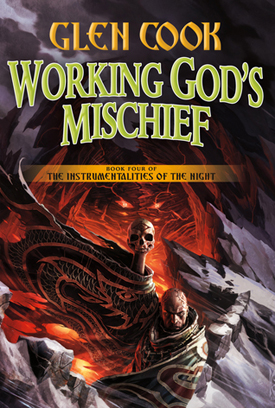 Working God’s Mischief is the fourth installment in Glen Cook’s Instrumentalities of the Night. It’s hard to know how to lead into this one, so I’m going to let Cook do it:
Working God’s Mischief is the fourth installment in Glen Cook’s Instrumentalities of the Night. It’s hard to know how to lead into this one, so I’m going to let Cook do it:
Arnhand, Castauriga, and Navaya lost their kings. The Grail Empire lost its empress. The Church lost its Patriarch, though he lives on as a fugitive. The Night lost Kharoulke the Windwalker, an emperor amongst the most primal and terrible gods. The Night goes on, in dread. The world goes on, in dread. The ice builds and slides southward.
That’s most of the prelude. The story picks up in media res: Piper Hecht, once the Praman Sha-Lug warrior-slave Else Tage, is now the Commander of the Righteous for the Grail Empire, the Righteous being the fighting force created to take a Crusade against the Praman to the Holy Land. Helspeth Ege, younger daughter of Johannes Blackboots, is the new Grail Empress. Kedle Richeut, widow of one of the Seekers After Light of the Connecten city of Antieux killed by the instruments of the Brothen Episcopal Church – the seekers being considered rampant heretics by the Church — has put together a fighting force of her own and, known as “the Widow,” seems bent on the total annihilation of Arnhand, or at least its queen and the former patriarch, whom she sees as the root of her misfortune. She’s actually correct in that. The results are not pretty – for the Arnhanders.
But first, there are some Old Gods to be dealt with.
In the meantime, in the realms of the Believers, Indala al-Sul Halaladin’s campaign to unite the Praman realms is not quite finished, while Nassim Alizarin, the Mountain, is facing a new threat from the Brotherhood of War of the Brothen Episcopal Church. There is also a dangerous wizard to be dealt with.
This is just a bare-bones descriptions of where we are at the beginning. Cook has once again given us an amazingly complex yet focused story, epic in scale but intimate in execution, concentrated on the core group of characters – Hecht, Helspeth, the Seeker Brother Candle, the Mountain – and their intimates.
I have to confess to having been somewhat lost when I started reading – after all, it was three years between this book and the last, and I didn’t go back to the last book to refresh my memory. And yet, it wasn’t really necessary: If you’re used to Glen Cook’s work at all, you’re used to the story being filled in as you need to know it, and it’s no different here. Deft references tickle the memory, and the reader fills in the backstory as much – or more – than Cook does.
That inferential quality is one that I think has struck me more than anything else about this series. While it’s always been a characteristic of Cook’s writing, it’s more apparent here. In retrospect, it seems that what is baldly stated is that which is relevant to the story’s here and now; the surround is given to us by implication. It makes for a rich context. (I might point out, in relation to that, that readers who want everything laid out clearly are not going to be happy.)
Characters are rendered the same way – we learn who they are from what they say and do, and equally, from how they say and do it. And when it comes right down to it, they’re very, very human, warts and all, which is an attitude that informs the book, the series, and Cook’s work as a whole: there’s a kind of world-weary acceptance here that just makes it that much more real.
If you haven’t embarked on this series, do it. You won’t be disappointed.
(Tor Books, 2014)
